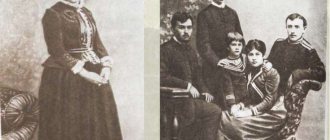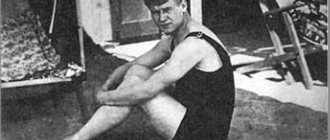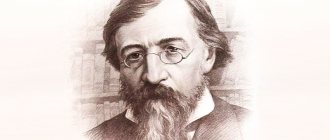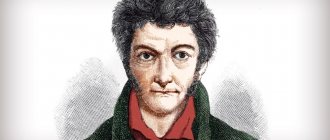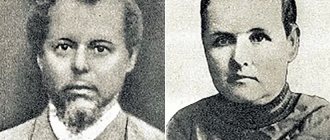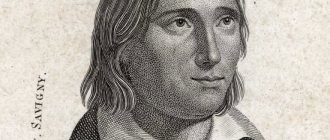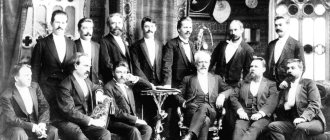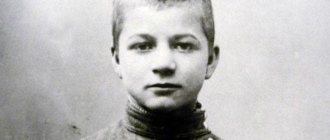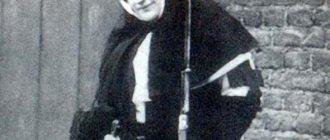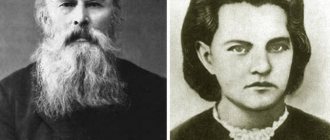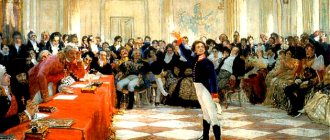Birth and childhood
Playwright Alexander Nikolaevich Ostrovsky was born on March 31 (April 12), 1823 in Moscow. His father, Nikolai Fedorovich, worked in court for many years, and in 1839 he earned the title of nobleman. The boy was left without a mother early, but his stepmother also paid him enough attention. She realized the need for education, so she tried to give her children the best (Mikhail and Alexander).
Their house had a huge library: Alexander often spent a lot of time in it. From childhood he realized his passion for literature. In addition, the father's income allowed him to provide his sons with a quality education. Alexander was taught several languages at once. Ostrovsky knew not only German and French, but also Greek. Later he began to master other languages.
Ostrovsky's biography is the most important
Ostrovsky Alexander Nikolaevich is a famous writer and gifted playwright in Russia.
Alexander Ostrovsky was born and raised in Moscow in the spring of 1823. Died of serious health problems in 1886. His mother died when the writer was still just a child.
It can be noted that Alexander is the 4th child in the family. Therefore, it should be added that his childhood was very difficult.
Alexander Nikolaevich studied at home and was a fairly educated person. His father's library aroused his obvious interest, and that is why Ostrovsky was also well-read. But his father really wanted the boy to have a legal education.
Alexander entered the Gymnasium in 1835. At that time he was only 12 years old. After graduating from the Gymnasium, he began studying at the university at the Faculty of Law. However, he was never able to complete his education: literature captivated him so much that he abandoned his studies.
In the future, Ostrovsky became very interested in theater. Among his first plays we can mention such as: “On a Lively Place” and “The Thunderstorm”. In total, it is estimated that he wrote about 50 plays. The very first work, which brought a great wave of popularity, is called “Our People - We Will Be Numbered!” He also became the author of such works as: “Dowry”, “Wolves and Sheep”, “Profitable Place”, “Poverty is not a Vice”, “Forest” and others.
Interesting facts about Alexander Nikolaevich
1. Popularity and fame.
As mentioned above, after the release of Ostrovsky’s work “Our People - Let’s Be Numbered!”, the writer received well-deserved fame. However, for a very long period of time the work was simply prohibited from publication, as it contained obscene language and elements of insult.
2. Life priorities.
Alexander Ostrovsky valued literature and theater very highly. It was because of this that he left the university. But when his father found out about this, he forced his son to work in a Moscow court in an abandoned specialty.
3. Clothing style.
The writer had a very specific taste. He preferred to dress the way he liked. However, he often did not want to leave the house because he was afraid of public opinion. He often thought that he would be “laughed at.”
4. Character or bad habits?
Alexander Nikolaevich Ostrovsky had a rather complex and difficult character. He was often overly confident in himself and loved to brag. Could be very offended by the comments of others or offended by an insufficiently appreciated work.
5. Problems with productions.
Ostrovsky often had problems staging plays in the theater. Because of his temper, he often quarreled with the actors and shouted at them. It was not easy for him to find a common language with people.
To summarize, we can say with confidence that Alexander Nikolaevich Ostrovsky made a huge contribution to the development of Russian literature and Russian theater. Ostrovsky is a very bright and extraordinary personality in history. His works are fascinating and easy to read. Alexander was a persistent person, and that is why he achieved what he wanted. I think this is what the reader remembers him for.
Youth and education
The father always wanted his son to choose a lawyer in the future. After graduating from high school, the young man entered Moscow University at the Faculty of Law (1840). However, Ostrovsky failed to complete it: after failing to pass the exam, he was expelled from the university (in 1843). The writer lost his passion for legal sciences.
Immediately after this, the father gets his son a job at the Moscow Conscientious Court, where Alexander served for seven years. The old man still did not lose hope of raising a successor and comrade-in-arms in his heir, but the young man was drawn to bohemia and creativity.
Alexander Ostrovsky: creativity
Ostrovsky's life and work are closely intertwined: everyday life provided excellent material for artistic research, and talent expanded his circle of acquaintances and made the writer famous. Ostrovsky's biography will reveal the stages of realization of his literary talent:
- The path to fame.
At the dawn of his creativity, Ostrovsky was captivated by the talent of Nikolai Gogol and Vissarion Belinsky. Their ability to evaluate and highlight colorful types and images from the flow of life became an aesthetic guide for the aspiring writer.
Alexander Ostrovsky in the early period of his work (1847–1851) was influenced by the natural school. Until 1850, his writing portfolio included scenes from merchant life and the play “Bankrupt.” “The Picture of Family Life”, the first play published in the “Moscow City List”, was highly appreciated by professionals. This was the moment when Ostrovsky the playwright was born.
Creative path
Ostrovsky had a variety of nicknames: “Columbus of Zamoskvorechye”, “new dramatic luminary”. All of them are connected with the author’s creative path: it was he who showed the hidden areas of Moscow, merchant life, depicting the life of ordinary people.
The very first publication took place in 1847. Two works by the author were published: the play “Picture of Family Life” and the essay “Notes of a Zamoskvoretsky Resident”. However, the playwright experienced real success only after releasing the comedy work “Our People – Let’s Be Numbered!” She brought him wide fame and recognition from authorities. But Ostrovsky’s plan could not be fully realized: the play was staged only once. Due to a complaint from merchants, it was banned from the theater (the playwright received approval only in 1861), and the author himself lost his position in court.
Another creation of Alexander Ostrovsky, “Don’t Get in Your Own Sleigh” (1852), turned out to be more successful. From this year on, he regularly created dramatic works, which could often be seen in many major theaters. And since 1856, he was on the list of permanent employees of Sovremennik. Many plays were written in this decade: “The Morning of a Young Man”, “An Unexpected Case”, “The Poor Bride” and others. Such works as “Don’t get into your own sleigh”, “Poverty is not a vice” do not expose the vices of the Russian person, but reflect the best traits of his character. Chernyshevsky saw in this the artificiality of the writer’s position.
After a long expedition from the sources of the Volga to Nizhny Novgorod, the author again returns to his previous style of writing. He again denounces officials and shows the life of the poor population. The following plays were released: “A Profitable Place”, “The Pupil”, “The Thunderstorm”.
In the second half of the 1860s, discussions about the historical past of our country appeared on the pages of Ostrovsky’s works. He created plays touching on important events for Russia: “Kuzma Zakharyich Minin-Sukhoruk”, “Dmitry the Pretender and Vasily Shuisky”, “Vasilisa Melentyeva”.
Alexander Ostrovsky played an important role in the development of Russian theater. In 1866 he organized an Artistic Circle. Thanks to him, many Russian actors developed and improved their skills.
OSTROVSKY
A. N. Ostrovsky. Portrait by V. G. Perov. 1871. Tretyakov Gallery (Moscow).
OSTROVSKY Alexander Nikolaevich [31.3(12.4).1823, Moscow – 2(14).6.1886, p. Shchelykovo Kineshma district. Kostroma province, now Ostrovsky district, Kostroma region], Russian. playwright, corresponding member Petersburg AN (1863). The son of a court official, elevated to progeny in 1853. nobility. Brother of M. N. Ostrovsky. Studied law. Faculty of Moscow university (1840–1843). Served in the offices of Moscow. Conscientious (1843–45) and Commercial (1845–51) courts. Since 1886 head. repertoire part of Moscow. theaters (Maly and Bolshoi), head of the theater school.
Early lit. experiments - the story “The Tale of How the Quarterly Warden Started to Dance, or From the Great to the Ridiculous Only One Step” (1843, published in 1924) and “Notes of a Zamoskvoretsky Resident” (1847) - in the spirit of the natural school. In 1847 he made his debut as a playwright, publishing “Scenes from the comedy “The Insolvent Debtor”” (other title: “Waiting for the Groom”; jointly with D. A. Gorev) and the one-act comedy “The Picture of Family Happiness” (in later publications - “ Family picture"). The first major work was the comedy “Our People – Let’s Be Numbered!” (other title - “Bankrupt”, 1850), in which O., acting as a successor to the traditions of dramaturgy of D. I. Fonvizin, N. V. Gogol, Moliere, for the first time in the country. literature showed the world of Moscow. merchants. By order of the Emperor. Nicholas I, the play, in which vice triumphed - deception, ignorance and rudeness, was banned from production (first staged in 1857 in Irkutsk, in 1861 in a censored edition - in the Alexandrinsky and Maly theaters, in the author's edition - in 1881 in Moscow. Dramatiche . Theater A. A. Brenko), and the author was under police surveillance (removed in September 1856). The first play staged on stage was a comedy from the life of petty bureaucrats, “The Poor Bride” (1852; staged in 1853), where O. first appears positive. heroine, according to her morals. qualities opposing the greedy, vulgar environment; O. will address the problem of the position of women in the family and society, raised in the play, later.
In 1850 O. became an employee of the railway. “Moskvityanin”, his so-called. the young editors, who gravitated towards the Slavophiles and shared, in particular, their interest in folklore and Russian. old times. During this “Muscovite period,” O. wrote plays in which he poeticized the life of the merchants, seeing in it an expression of nationalism. features of Russian life in general and connecting his search for positive principles with a strong and orderly merchant. family life, oriented towards Christian morality and respect for centuries-old traditions. These are the so-called folk comedies addressed to broad democracy. audiences, which marked a turn in theatrical aesthetics and laid the foundation for the creation of a national repertoire: “Don’t Get in Your Own Sleigh” (1853), “Poverty is not a Vice” (1854), drama “Don’t Live the Way You Want” (posted in 1854, published in 1855), built, as a rule, on everyday material, distinguished by a clearly expressed morality, formulated already in the names themselves, and the schematic nature of the conflict (the clash of a love feeling with cold calculation).
In 1856, O., at the invitation of N. A. Nekrasov, moved to the railway. "Contemporary". The plays of this period are characterized by social acuity, dramatic situations, and intense conflict. In the comedy “At Someone Else's Feast there is a Hangover” (1856), O., in the image of Tit Titych Bruskov, was the first to bring out the socio-psychological. a type of wild and unbridled tyrant, whose description he repeatedly turned to later. In the comedy “Profitable Place” (1857, staged in 1863), which was banned from production, he criticized the state. bureaucratic an apparatus based on bribery, embezzlement, mutual responsibility. The drama “The Pupil” (1859, staged in 1863) about a despotic landowner who decides the fate of young people at her own discretion was also prohibited from production. Most means. the play of this period is “The Thunderstorm” (posted in 1859, published in 1860), which combined the features of social, everyday and moral-psychological. a drama in which a family situation, a conflict of passion and duty, are raised to the level of a socially significant problem and for the first time brought to a tragic point. denouement, and the features of Russian. national character and people lives are given in their extreme manifestations. In the trilogy about Balzaminov [the comedy “A Festive Dream - Before Dinner”, 1857, “Your dogs are biting - don’t pester someone else’s”, 1861, “What you go for is what you will find (The Marriage of Balzaminov)”, 1861, is prohibited for production; fast. in 1863] O., using vaudeville and folk techniques. farcical performance, brought out a parodic image of a “little man” - a poor official, not adapted to life, relying on a happy coincidence of circumstances.
In 1862 O. made a trip to Europe, visited Bavaria, Prussia, Italy, and France; in London met with A.I. Herzen. Upon returning from abroad, he created the dramas “Sin and Misfortune” (1863), “The Deep” (1866), the comedies “Hard Days” (1863), “Jokers” (1864), “On a Lively Place” ( 1865). In the 1860s. O., who saw in the study of national history is the key to educating “conscious love for the fatherland”, turned to the historical genre. plays: the chronicle “Kozma Zakharyich Minin-Sukhoruk” (in verse, 1862, prohibited from production; 2nd ed. - 1866, was not published during the author’s lifetime; post. in 1866), comedy “The Voevoda (Dream on the Volga) "(in verse, 1865; 2nd ed. - 1885, was not published during O.'s lifetime), "Comedian of the 17th century" (in verse; post. in 1872; published in 1873), etc. O. included in the text of the plays, letters, decrees, etc. historical. documentation; introduced jesters, buffoons, holy fools, and heralds into the cast of characters; used archaisms.
In 1868–84 - during the period of O.’s collaboration in railways. “Domestic Notes” - satirical works appear. comedies from the life of the nobility, marked by complex acting from traditions. dramatic techniques technique (stage role), using lit. quotes and reminiscences: “Simplicity is enough for every wise man” (1868), “Mad Money” (1870), “Wolves and Sheep” (1875), in which there is no positive hero, as well as “The Forest” (1871) - one of the best plays of late O., where evil is opposed by heroes who are victims in the plot (a poor artist and a girl without a dowry). The combination of features of satirical (grotesque-conventional style) and folk (folklore motifs) comedies is inherent in the play “Warm Heart” (1869). To the genre of folklore Comedy O. returns in the plays “Maslenitsa is not everything for the cat” (1871), “Truth is good, but happiness is better” (posted in 1876, published in 1877), etc. Standing apart among them is the play “The Snow Maiden” (in verse , 1873), combining the features of a folk tale and lyric. dramas.
O.'s later plays are distinguished by a combination of lyricism and drama; positivity reappears in them. a hero with a complex inner peace and a vulnerable soul: “The Last Sacrifice” (1878), “The Heart is Not a Stone” (1880), “Not of This World” (1885), etc. At the center of the drama is “Dowry” (posted in 1878, published in 1879 ) - the image of a loving woman, whose sincerity and gullibility are contrasted with the soulless calculation and cynical selfishness of others. Behind-the-scenes morals of an artist. Wednesdays they draw the comedy “Talents and Admirers” (posted in 1881, published in 1882), the comedy “Guilty Without Guilt” (1884). A number of plays were written by O. in collaboration with N. Ya. Solovyov ["Happy Day" (1877), "The Marriage of Belugin" (posted in 1877, published in 1878), "Savage" (posted in 1879, published in 1880), “It shines, but does not warm” (posted in 1880, published in 1881)] and with P. M. Nevezhin [“Whim” (posted in 1880, published in 1881), “Old in a new way "(departmental edition under the name of one Nevezhin, 1882)]. Other works include opera librettos and translations.
Monument to A. N. Ostrovsky in Moscow near the Maly Theater. Sculptor N. A. Andreev. Bronze, granite. 1924–29. Photo by A. I. Nagaev
O. – founder of the national Russian repertoire theater His dramaturgy, rooted both in the literary (domestic and foreign) and folklore traditions and addressed to the most diverse layers of society, is characterized by a wide coverage of reality in its everyday life - everyday, social and ethnographic. details; a combination of “large comic” with the depiction of deep passions and sincere feelings; masterful use of the entire wealth of national vocabulary to create speech characteristics of the characters, which compensates for the often poorly developed intrigue. O.'s plays, especially those of the 1870s–80s, which were not oriented toward the department. actors, and for the entire acting ensemble, they carried out a reform in Russian. theater Actors S. V. Vasiliev (see Vasilievs), M. N. Ermolova, A. E. Martynov, L. P. Kositskaya, P. M. Sadovsky, M. P. Sadovsky, O. O. Sadovskaya shone in them (see Sadovsky), G.N. Fedotova and others. On O.’s initiative, Moscow was founded. artistic circle (1865), Collection of Russian. dramatic writers (1870; since 1874 the Society of Russian Dramatic Writers to protect the material interests of playwrights, and since 1875 – of opera composers), which was engaged in protecting the copyrights of playwrights and composers.
O.'s name is Dramatic. theater in Kostroma.
Personal life
Alexander Nikolaevich Ostrovsky was in a civil marriage with a poor girl Agafya Ivanovna. Unfortunately, the playwright did not have a single child left from this relationship - all four babies died. Despite the fact that the woman had no education, she was always the first to read and evaluate Ostrovsky’s works. Agafya had a subtle and sensitive soul.
In 1867, Agafya dies, and two years later he marries actress Maria Vasilyevna Bakhmetyeva. The new lover gave birth to six children to the playwright.
A. N. Ostrovsky: biography of the “Muscovite” and “pre-reform” periods
Ostrovsky's dramaturgy is gaining strength. During the period 1852-1860 the following events occur:
- Production of the play “Don’t Get in Your Own Sleigh.”
- Publication of the play “Poverty is not a vice.”
- Ostrovsky is a member of the young editorial board of the Moskvityanin magazine.
- Since 1856 - cooperation with the Sovremennik magazine. Acquaintance with L. N. Tolstoy and I. S. Turgenev.
- 1856 - participation in a literary and ethnographic expedition along the Volga. A wealth of material has been collected for future works.
Interesting Facts
- Rimsky-Korsakov and P.I. Tchaikovsky wrote the opera “The Snow Maiden” based on Ostrovsky’s play.
- It was Ostrovsky who created the theater as we can see it now. The author carried out a reformation of the usual theatrical production and acting. His activities were subsequently continued by K.S. Stanislavsky, M.A. Bulgakov.
- In 1874, the playwright was one of the organizers of the Society of Russian Dramatic Writers and Opera Composers. He managed to improve the situation of the actors and make improvements to theatrical life.
- Since 1885, the author held a high position: he was the head of the theater school, and was also responsible for the repertoire of Moscow theaters.
- He knew the leading people of his era. He was often visited by such personalities as L.N. Tolstoy, I.A. Goncharov, F.M. Dostoevsky, M.N. Ermolova.
- While in a civil marriage with Agafya, Ostrovsky confessed his love to actress Lyubov Kositskaya. However, the girl never reciprocated the playwright’s feelings. In 1859, she was assigned the role of Katerina (“The Thunderstorm”).
- The playwright lived in debt all the time. Despite the pension, which amounted to three thousand, the author’s high earnings were constantly short of money. Over time, exhausting work led to deterioration of health, and significant funds were required for treatment.
At the peak of popularity
In 1856, Alexander Nikolaevich Ostrovsky went to the Volga region to study the way of life of the inhabitants of the region. It was after this trip that Ostrovsky wrote one of his most striking plays - “The Thunderstorm”. In 1859, the first collected works of Ostrovsky were published, which were enthusiastically received by critics. In the 1860s, Ostrovsky began to study Russian history, and he was especially interested in the Time of Troubles.
In 1863 he was awarded the Uvarov Prize and became a corresponding member of the St. Petersburg Academy of Sciences. In the 60s, the playwright founded the Artistic Circle, which gave a start in life to many future stars of the Russian stage. In 1874, on the initiative of Ostrovsky, the Society of Russian Dramatic Writers and Opera Composers was founded. In 1885, Alexander Nikolaevich became the head of the repertoire of all Moscow theaters.
All his life Ostrovsky worked extremely hard, this seriously undermined his health. In June 1886, he died on his estate in the Kostroma province. Emperor Alexander III granted a large sum for the funeral of the playwright, and also assigned a pension to his widow and allocated funds for the education of his children.
Ostrovsky's plays show the life and everyday life of ordinary people; his works are very realistic, but at the same time pose deep and eternal problems to the viewer.
Ostrovsky can be called the founder of the Russian theater; he created a new theater school and a new concept of acting.
At the beginning of the 19th century, the famous writer and playwright A. N. Ostrovsky was born, whose biography is filled with participation in the bright events of the theatrical and literary life of Russia at that time.
Death
The playwright died in his sixty-third year of life (June 12, 1886), presumably due to angina pectoris. The literary and public figure was buried next to his father in a cemetery in the village of Nikolo-Berezhki, Kostroma province.
A. N. Ostrovsky made an invaluable contribution to the development of theatrical art; he formed the Russian national theater, which was distinguished by its originality and unique flavor of the era. He managed to give a comprehensive description of his era and subtly notice the social and political changes taking place in Russia. He also created a gallery of living and natural images reflecting the Russian mentality. Global social conflicts, which he saw in everyday trifles and fleeting conversations, still become interesting subjects for modern viewers: they have been filmed and appeared on stage more than once. All this proves the significance of this literary figure for Russian culture.
Author: Anastasia Smetanova
